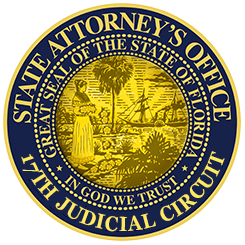Broward prosecutors work to clear 1980s/90s records of people accused of buying crack cocaine manufactured by law enforcement
December 6, 2024
UPDATE: If you think you or a family member may have been affected, you can email our office at casereview@browardsao.com or call 954-831-6543. You do not have to contact us to be eligible, all cases will be reviewed. You do not need to hire an attorney.
More than 30 years after the Florida Supreme Court ruled that crack cocaine manufactured by law enforcement in the late 1980s and early 1990s could not be used in reverse-sting arrests, prosecutors are taking action to clear the records of anyone whose arrest was linked to the manufactured “evidence,” Broward State Attorney Harold F. Pryor announced on Friday.
During a routine review of public documents in our archives section, Broward prosecutors realized that hundreds of individuals arrested and charged in those stings may still have criminal arrests and convictions on their records.
“It is never too late to do the right thing,” State Attorney Harold F. Pryor said. “The methods used by law enforcement and society to combat drug dealing in our community have evolved since that era. These records may be a dim memory or an unfortunate part of history to many, but they have had a long-lasting and severe impact on the lives of the people who were arrested – as well as their families and the wider community.”
On Thursday, Pryor wrote to Broward Sheriff Gregory Tony notifying him of the prosecution’s decision to begin taking court action to vacate or remove the judgments and sentences of individuals who were arrested and convicted of purchasing crack cocaine that was manufactured by some at the agency and used in reverse stings orchestrated by BSO between 1988 and 1990. Read the letter here.
Broward prosecutors also prosecuted those cases at the time.
“These matters were well before our tenures. However, I am of the opinion that the State has an ethical duty and obligation to correct this injustice before destruction [of old records] is initiated,” State Attorney Pryor wrote in the letter to Sheriff Tony.
Sheriff Tony immediately contacted State Attorney Pryor and said he agreed it is the right thing to do and that he supports the project.
In 1993, the Florida Supreme Court ruled in State of Florida v. Leon Williams, 623 So.2d 462 that law enforcement’s conduct in illegally manufacturing crack cocaine was so outrageous that it violated the due process clause of the Florida Constitution. Read the Florida Supreme Court’s 1993 decision here.
The scandal was widely reported in local media at the time and led to several lawsuits.
Recently, State Attorney’s Office staff members were reviewing public records that have been kept for longer than the agency’s public records retention schedule requires. Those records were under consideration to be destroyed, in compliance with the law.
There is no indication in the records that many of those cases were ever formally vacated. That means there could be ongoing repercussions for those individuals in terms of criminal records, getting employment, housing, etc.
At least some of the charges filed were first-degree felonies involving arrests of individuals within 1,000 feet of a school (the offense carried a mandatory minimum three-year prison term at the time).
The process of reviewing the paper files will take a considerable amount of time. Some estimates indicate there may be as many as 2,600 cases. Prosecutors and staff will also work to determine individuals’ eligibility to seal or expunge those records.
If you think you may have been affected by this matter, you do not need to contact either agency. Prosecutors from the State Attorney’s Office will review all relevant records and file the appropriate court paperwork to vacate or remove the arrests and convictions from individuals’ records. Our staff will then attempt to contact everyone affected.
Assistant State Attorneys Joel Silvershein and Steven Klinger, the chiefs of the Appeals Unit and the Special Administrative Projects Unit, will lead the review.
Read State Attorney Pryor’s letter here.
Read the Florida Supreme Court’s 1993 decision here.
The original case number for Mr. Williams case is 90003594CF10A on www.browardclerk.org
MEDIA INQUIRIES:
mediarelations@sao17.state.fl.us
or 954-831-7910
PUBLIC RECORDS REQUESTS:
prrequests@sao17.state.fl.us

